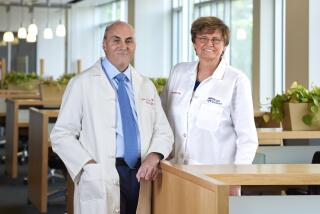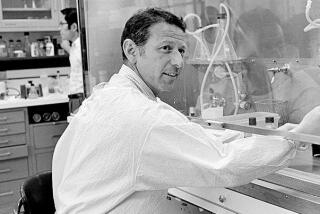Dr. Salvador Luria; Molecular Biology Pioneer
- Share via
CAMBRIDGE, Mass. — Dr. Salvador E. Luria, a pioneer in molecular biological research who shared the Nobel Prize for medicine in 1969, died of a heart attack Wednesday. He was 78.
Luria died at his home in Lexington, Mass., said Robert Di Iorio, a spokesman for the Massachusetts Institute of Technology, where Luria had been a faculty member since 1959.
Luria shared the Nobel Prize with Dr. Max Delbruck of Caltech in Pasadena and Dr. Alfred Hershey of the Carnegie Institute in Washington for research regarded as playing a major role in the control of viral diseases and in advances in molecular biology.
Luria and Delbruck also received the prestigious Louisa Gross Horwitz Prize for their work in the genetics of bacteria, seen as a cornerstone of viral studies.
Born in Turin, Italy, Luria received a medical degree from the University of Turin and became a specialist in radiology at the University of Rome.
In 1938, he fled the regime of Benito Mussolini, moving first to Paris and then to the United States in 1940. From his arrival until 1943, he worked at Columbia, Vanderbilt and Princeton universities.
Between 1943 and his move to MIT, he served on the faculties of Indiana University and the University of Illinois and lectured at Notre Dame.
A man with a wide range of interests, Luria said that when he became an American citizen in 1947, he decided to vigorously exercise the intellectual freedoms he had in his adopted country.
“What scientific achievement I have reached is due to the freedom provided in this wealthy country to all aspects of intellectual enterprise,” he said.
He became active in the peace movement and urged his students at MIT and Harvard to become involved in matters beyond the realm of science and medicine.
Luria sculpted as a hobby. As a writer, he won the 1974 National Book Award in the sciences for his book “Life: The Unfinished Experiment,” which was translated into five languages.






